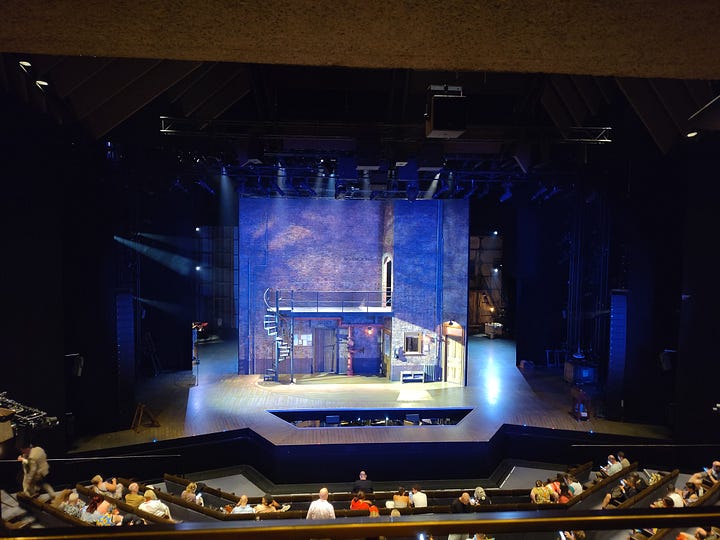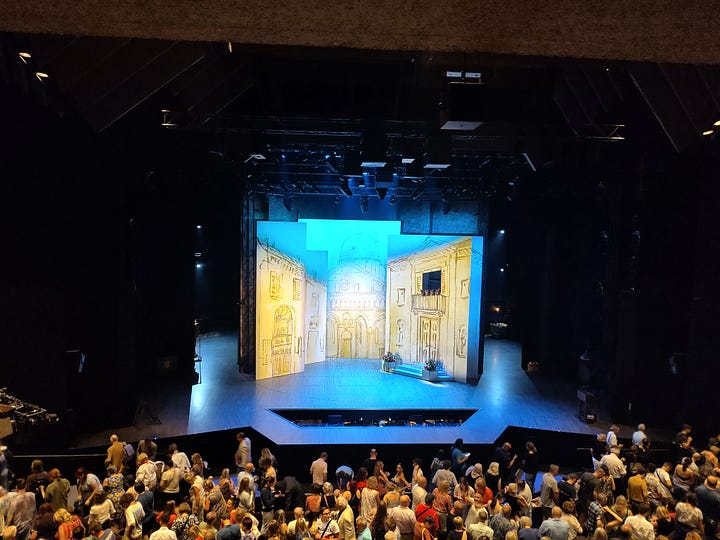Kiss Me, Kate - Review
Well produced and funny, generously camp and aesthetically fantastic, but with a creepy undertone that harks back to a pre-#MeToo era.
Barbican Theatre, until 14th September 2024.
Tickets from £29.50, or £20 for 16-25 year olds.
Rating: ★★★
Kiss Me, Kate was written in 1948, and is set at the same time. It takes place almost entirely during a theatre production of The Taming of the Shrew (with our female romantic lead playing Kate, the Shrew). Knowing this, it shouldn’t be surprising that it doesn’t hold up to modern standards of sexual morality, and indeed I didn’t expect that. I expected bawdiness, objectification, a failure of the Bechdale test and crude double entendre- all of which were delivered. But does our first impression of the romantic male lead really need to be that he’s given a woman young enough to be his granddaughter a role in exchange for a romp in her dressing room twin bed? Not only does it leave an unpleasant, distinctly Weinstein-esque taste in the mouth, it immediately turned me against a character who, while flawed, is supposed to be one we fundementally root for.
It is a classic, so one understands the desire to play it exactly as original, and it would certainly be harmed by major changes to bring it up to the cutting edge. But it could have benefitted from some light changes to relationships and the presentation of women. It’s hard to root for the romance when the male lead is, by today’s standards, a dangerous predator, and the female lead’s feelings about men as a woman in the 1940s do not come off as naive or misguided as they may have at first performance. As it stands, the only sign we’re not seeing it in 1948 is the relatively diverse casts and a couple of same-sex dance partnerships in the background.
That said, for what it is, it’s very well executed. The dual settings of 1940s Baltimore and medieval Italy (as imagined by 1940s Americans, at least) provide beautiful contrast between a semi-serious, sensuous romance and extremely funny, brightly coloured, joyful camp.
Stephanie J. Block plays a fantastic pining divorcee, believable and playful to the point you want to sit her down and tell her she deserves better than the aforementioned male lead. Hammed Animashaun and Nigel Lindsay provide impeccibly written and acted comic relief in the form of two pinstripe gangsters with a surprising and heartfelt love of the Bard. No cast member or characterisation otherwise lets it down, many are now recognizeable tropes (an elderly suitor; a sugar baby with a childish voice to match; a gambling addict who loves her) but executed with enough skill and confidence that they have the charm of a pantomime rather than the cringe of community theatre.
The costuming is fantastic, capturing the 1940s of the core narrative effortlessly, while also capturing the charming disorder and improvisation of a traveling Shakespeare company (men wear womens blouses, nobody quite matches, it’s excellent). The staging equally so- a revolving stage is used to great effect to transport us between bricky backstage areas and a charmingly watercolour Padua.


The music is especially fantastic, the orchestra perfectly in tune with the cast and taking full advantage of the Barbican’s perfect accoustics. The occasional interaction between the cast and conductor is an especially charming touch.
But for all the sensory fun, it’s hard to truly enjoy in our current climate. The sexual harrassment and violence is mild but frequent, and treated with such a sense of normalcy that it leaves an unfortunate bitterness in an otherwise sugary sweet evening out.



